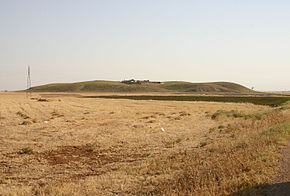Urkesh

View of Tell Mozan from the north.
|
|
| Alternate name | Tell Mozan |
|---|---|
| Location | Al-Hasakah Governorate, Syria |
| Region | Taurus Mountains |
| Coordinates | 37°3′25″N 40°59′50″E / 37.05694°N 40.99722°ECoordinates: 37°3′25″N 40°59′50″E / 37.05694°N 40.99722°E |
| Type | Settlement |
| History | |
| Founded | 4th millennium BC |
| Abandoned | 1st millennium BC |
| Site notes | |
| Condition | In ruins |
Urkesh or Urkish (modern Tell Mozan; Arabic: تل موزان) is a tell, or settlement mound, located in the foothills of the Taurus Mountains in Al-Hasakah Governorate, northeastern Syria. It was founded during the fourth millennium BC possibly by the Hurrians on a site which appears to have been inhabited previously for a few centuries.
There are other contemporary ancient sites in this area of upper Khabur River basin. For example, Chagar Bazar is 22km south of Mozan. Tell Arbid is located 45km south of Tell Mozan. Tell Brak is about 50km to the south.
Tell Leilan is located about 50km to the east of Urkesh. Leilan, Brak and Urkesh were particularly prominent during the Akkadian period.
Urkesh was an ally of the Akkadian Empire through what is believed to have been a dynastic marriage tradition. Tar'am-Agade the daughter of the Akkadian king, Naram-Sin, is believed to have been married to the king of Urkesh. During the early second millennium BC the city passed into the hands of the rulers of Mari, a city a few hundred miles to the south. The king of Urkesh became a vassal (and apparently an appointed puppet) of Mari. The people of Urkesh evidently resented this, as the royal archives at Mari provide evidence of their strong resistance; in one letter, the king of Mari tells his Urkesh counterpart that "I did not know that the sons of your city hate you on my account. But you are mine, even if the city of Urkesh is not." In the middle of the millennium, Tell Mozan was the location of a Mitanni religious site. The city appears to have been largely abandoned circa 1350 BC, although the reason for this is unknown to archaeologists at this time.
...
Wikipedia

